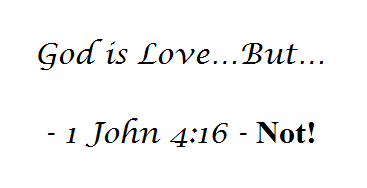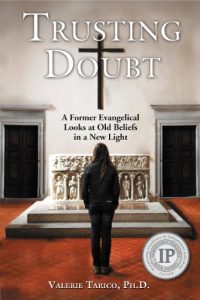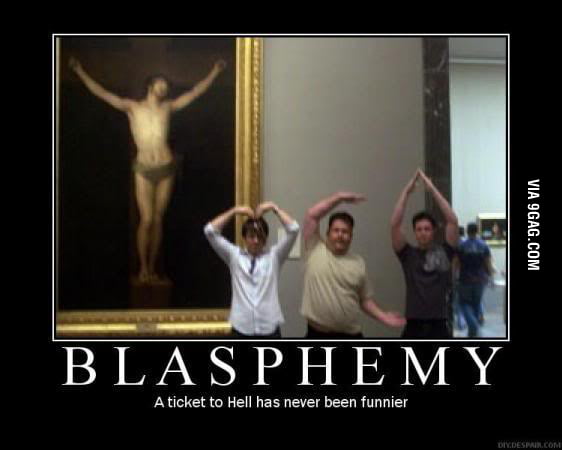As you have probably guessed from other articles on my blog, I have a strong interest in helping people to come to terms with large changes in their spiritual lives. These changes can be due to divorce, bereavement, spiritual growth and its associated ‘growing pains’, or more sinister things like dealing with spiritual abuse and religious trauma, where people are either trapped (knowingly or unknowingly) in spiritual abuse systems – which are loosely described in this article – or where they have broken free from such systems and are having to cope with the trauma of what is essentially a major loss of part of one’s life.
This post, by Dr. Valerie Tarico, is quoted from the RawStory site, and the link to the original article is given at the end. In this article, Dr. Tarico quotes much from Dr. Marlene Winnell, who is a human development consultant, and who first used the term ‘Religious Trauma Syndrome’. Unsurprisingly, her use of the term made waves, most likely (my guess, anyway) amongst people who didn’t want their abusive ways brought to light. Here’s the article in full, with original links intact insofar as they work. Note that the title refers only to some, not all, organised religion.
Religious Trauma Syndrome: How some organized religion leads to mental health problems
At age sixteen I began what would be a four-year struggle with bulimia. When the symptoms started, I turned in desperation to adults who knew more than I did about how to stop shameful behavior—my Bible study leader and a visiting youth minister. “If you ask anything in faith, believing,” they said. “It will be done.” I knew they were quoting the Word of God. We prayed together, and I went home confident that God had heard my prayers.
But my horrible compulsions didn’t go away. By the fall of my sophomore year in college, I was desperate and depressed enough that I made a suicide attempt. The problem wasn’t just the bulimia. I was convinced by then that I was a complete spiritual failure. My college counseling department had offered to get me real help (which they later did). But to my mind, at that point, such help couldn’t fix the core problem: I was a failure in the eyes of God. It would be years before I understood that my inability to heal bulimia through the mechanisms offered by biblical Christianity was not a function of my own spiritual deficiency but deficiencies in Evangelical religion itself.
Dr. Marlene Winell is a human development consultant in the San Francisco Area. She is also the daughter of Pentecostal missionaries. This combination has given her work an unusual focus. For the past twenty years she has counseled men and women in recovery from various forms of fundamentalist religion including the Assemblies of God denomination in which she was raised. Winell is the author of Leaving the Fold – A Guide for Former Fundamentalists and Others Leaving their Religion, written during her years of private practice in psychology. Over the years, Winell has provided assistance to clients whose religious experiences were even more damaging than mine. Some of them are people whose psychological symptoms weren’t just exacerbated by their religion, but actually caused by it.
Two years ago, Winell made waves by formally labeling what she calls “Religious Trauma Syndrome” (RTS) and beginning to write and speak on the subject for professional audiences. When the British Association of Behavioral and Cognitive Psychologists published a series of articles on the topic, members of a Christian counseling association protested what they called excessive attention to a “relatively niche topic.” One commenter said, “A religion, faith or book cannot be abuse but the people interpreting can make anything abusive.”
Is toxic religion simply misinterpretation? What is religious trauma? Why does Winell believe religious trauma merits its own diagnostic label? I asked her.
Let’s start this interview with the basics. What exactly is religious trauma syndrome?
Winell: Religious trauma syndrome (RTS) is a set of symptoms and characteristics that tend to go together and which are related to harmful experiences with religion. They are the result of two things: immersion in a controlling religion and the secondary impact of leaving a religious group. The RTS label provides a name and description that affected people often recognize immediately. Many other people are surprised by the idea of RTS, because in our culture it is generally assumed that religion is benign or good for you. Just like telling kids about Santa Claus and letting them work out their beliefs later, people see no harm in teaching religion to children.
But in reality, religious teachings and practices sometimes cause serious mental health damage. The public is somewhat familiar with sexual and physical abuse in a religious context. As Journalist Janet Heimlich has documented in, Breaking Their Will, Bible-based religious groups that emphasize patriarchal authority in family structure and use harsh parenting methods can be destructive.
But the problem isn’t just physical and sexual abuse. Emotional and mental treatment in authoritarian religious groups also can be damaging because of 1) toxic teachings like eternal damnation or original sin 2) religious practices or mindset, such as punishment, black and white thinking, or sexual guilt, and 3) neglect that prevents a person from having the information or opportunities to develop normally.
Can you give me an example of RTS from your consulting practice?
Winell: I can give you many. One of the symptom clusters is around fear and anxiety. People indoctrinated into fundamentalist Christianity as small children sometimes have memories of being terrified by images of hell and apocalypse before their brains could begin to make sense of such ideas. Some survivors, who I prefer to call “reclaimers,” have flashbacks, panic attacks, or nightmares in adulthood even when they intellectually no longer believe the theology. One client of mine, who during the day functioned well as a professional, struggled with intense fear many nights. She said,
“I was afraid I was going to hell. I was afraid I was doing something really wrong. I was completely out of control. I sometimes would wake up in the night and start screaming, thrashing my arms, trying to rid myself of what I was feeling. I’d walk around the house trying to think and calm myself down, in the middle of the night, trying to do some self-talk, but I felt like it was just something that – the fear and anxiety was taking over my life”.
Or consider this comment, which refers to a film used by Evangelicals to warn about the horrors of the “end times” for nonbelievers.
“I was taken to see the film “A Thief In The Night”. WOW. I am in shock to learn that many other people suffered the same traumas I lived with because of this film. A few days or weeks after the film viewing, I came into the house and mom wasn’t there. I stood there screaming in terror. When I stopped screaming, I began making my plan: Who my Christian neighbors were, whose house to break into to get money and food. I was 12 yrs old and was preparing for Armageddon alone”.
In addition to anxiety, RTS can include depression, cognitive difficulties, and problems with social functioning. In fundamentalist Christianity, the individual is considered depraved and in need of salvation. A core message is “You are bad and wrong and deserve to die.” (The wages of sin is death.) This gets taught to millions of children through organizations like Child Evangelism Fellowship, and there is a group organized to oppose their incursion into public schools. I’ve had clients who remember being distraught when given a vivid bloody image of Jesus paying the ultimate price for their sins. Decades later they sit telling me that they can’t manage to find any self-worth.
“After twenty-seven years of trying to live a perfect life, I failed. . . I was ashamed of myself all day long. My mind battling with itself with no relief. . . I always believed everything that I was taught but I thought that I was not approved by God. I thought that basically I, too, would die at Armageddon.
“I’ve spent literally years injuring myself, cutting and burning my arms, taking overdoses and starving myself, to punish myself so that God doesn’t have to punish me. It’s taken me years to feel deserving of anything good.
“Born-again Christianity and devout Catholicism tell people they are weak and dependent, calling on phrases like “lean not unto your own understanding” or “trust and obey.” People who internalize these messages can suffer from learned helplessness. I’ll give you an example from a client who had little decision-making ability after living his entire life devoted to following the “will of God.” The words here don’t convey the depth of his despair.
“I have an awful time making decisions in general. Like I can’t, you know, wake up in the morning, “What am I going to do today? Like I don’t even know where to start. You know all the things I thought I might be doing are gone and I’m not sure I should even try to have a career; essentially I babysit my four-year-old all day”.
Authoritarian religious groups are subcultures where conformity is required in order to belong. Thus if you dare to leave the religion, you risk losing your entire support system as well.
“I lost all my friends. I lost my close ties to family. Now I’m losing my country. I’ve lost so much because of this malignant religion and I am angry and sad to my very core. . . I have tried hard to make new friends, but I have failed miserably. . . I am very lonely”.
Leaving a religion, after total immersion, can cause a complete upheaval of a person’s construction of reality, including the self, other people, life, and the future. People unfamiliar with this situation, including therapists, have trouble appreciating the sheer terror it can create.
“My form of religion was very strongly entrenched and anchored deeply in my heart. It is hard to describe how fully my religion informed, infused, and influenced my entire worldview. My first steps out of fundamentalism were profoundly frightening and I had frequent thoughts of suicide. Now I’m way past that but I still haven’t quite found “my place in the universe”.
Even for a person who was not so entrenched, leaving one’s religion can be a stressful and significant transition.
Many people seem to walk away from their religion easily, without really looking back. What is different about the clientele you work with?
Winell: Religious groups that are highly controlling, teach fear about the world, and keep members sheltered and ill-equipped to function in society are harder to leave easily. The difficulty seems to be greater if the person was born and raised in the religion rather than joining as an adult convert. This is because they have no frame of reference – no other “self” or way of “being in the world.” A common personality type is a person who is deeply emotional and thoughtful and who tends to throw themselves wholeheartedly into their endeavors. “True believers” who then lose their faith feel more anger and depression and grief than those who simply went to church on Sunday.
Aren’t these just people who would be depressed, anxious, or obsessive anyways?
Winell: Not at all. If my observation is correct, these are people who are intense and involved and caring. They hang on to the religion longer than those who simply “walk away” because they try to make it work even when they have doubts. Sometime this is out of fear, but often it is out of devotion. These are people for whom ethics, integrity and compassion matter a great deal. I find that when they get better and rebuild their lives, they are wonderfully creative and energetic about new things.
In your mind, how is RTS different from Post Traumatic Stress Disorder?
Winell: RTS is a specific set of symptoms and characteristics that are connected with harmful religious experience, not just any trauma. This is crucial to understanding the condition and any kind of self-help or treatment. (More details about this can be found on my Journey Free website and discussed in my talk at the Texas Freethought Convention.)
Another difference is the social context, which is extremely different from other traumas or forms of abuse. When someone is recovering from domestic abuse, for example, other people understand and support the need to leave and recover. They don’t question it as a matter of interpretation, and they don’t send the person back for more. But this is exactly what happens to many former believers who seek counseling. If a provider doesn’t understand the source of the symptoms, he or she may send a client for pastoral counseling, or to AA, or even to another church. One reclaimer expressed her frustration this way:
“Include physically-abusive parents who quote “Spare the rod and spoil the child” as literally as you can imagine and you have one fucked-up soul: an unloved, rejected, traumatized toddler in the body of an adult. I’m simply a broken spirit in an empty shell. But wait…That’s not enough!? There’s also the expectation by everyone in society that we victims should celebrate this with our perpetrators every Christmas and Easter!!”
Just like disorders such as autism or bulimia, giving RTS a real name has important advantages. People who are suffering find that having a label for their experience helps them feel less alone and guilty. Some have written to me to express their relief:
“There’s actually a name for it! I was brainwashed from birth and wasted 25 years of my life serving Him! I’ve since been out of my religion for several years now, but i cannot shake the haunting fear of hell and feel absolutely doomed. I’m now socially inept, unemployable, and the only way i can have sex is to pay for it”.
Labeling RTS encourages professionals to study it more carefully, develop treatments, and offer training. Hopefully, we can even work on prevention.
What do you see as the difference between religion that causes trauma and religion that doesn’t?
Winell: Religion causes trauma when it is highly controlling and prevents people from thinking for themselves and trusting their own feelings. Groups that demand obedience and conformity produce fear, not love and growth. With constant judgment of self and others, people become alienated from themselves, each other, and the world. Religion in its worst forms causes separation.
Conversely, groups that connect people and promote self-knowledge and personal growth can be said to be healthy. The book, Healthy Religion, describes these traits. Such groups put high value on respecting differences, and members feel empowered as individuals. They provide social support, a place for events and rites of passage, exchange of ideas, inspiration, opportunities for service, and connection to social causes. They encourage spiritual practices that promote health like meditation or principles for living like the golden rule. More and more, nontheists are asking how they can create similar spiritual communities without the supernaturalism. An atheist congregation in London launched this year and has received over 200 inquiries from people wanting to replicate their model.
Some people say that terms like “recovery from religion” and “religious trauma syndrome” are just atheist attempts to pathologize religious belief.
Winell: Mental health professionals have enough to do without going out looking for new pathology. I never set out looking for a “niche topic,” and certainly not religious trauma syndrome. I originally wrote a paper for a conference of the American Psychological Association and thought that would be the end of it. Since then, I have tried to move on to other things several times, but this work has simply grown.
In my opinion, we are simply, as a culture, becoming aware of religious trauma. More and more people are leaving religion, as seen by polls showing that the “religiously unaffiliated” have increased in the last five years from just over 15% to just under 20% of all U.S. adults. It’s no wonder the internet is exploding with websites for former believers from all religions, providing forums for people to support each other. The huge population of people “leaving the fold” includes a subset at risk for RTS, and more people are talking about it and seeking help. For example, there are thousands of former Mormons, and I was asked to speak about RTS at an Exmormon Foundation conference. I facilitate an international support group online called Release and Reclaim which has monthly conference calls. An organization called Recovery from Religion, helps people start self-help meet-up groups
Saying that someone is trying to pathologize authoritarian religion is like saying someone pathologized eating disorders by naming them. Before that, they were healthy? No, before that we weren’t noticing. People were suffering, thought they were alone, and blamed themselves. Professionals had no awareness or training. This is the situation of RTS today. Authoritarian religion is already pathological, and leaving a high-control group can be traumatic. People are already suffering. They need to be recognized and helped.
—- Dr. Marlene Winell is a human development consultant in the San Francisco Bay Area and the author of Leaving the Fold – A Guide for Former Fundamentalists and Others Leaving their Religion. More information about Marlene Winell and resources for getting help with RTS may be found at Journey Free. Valerie Tarico is a psychologist and writer in Seattle, Washington. She is the author of Trusting Doubt: A Former Evangelical Looks at Old Beliefs in a New Light and Deas and Other Imaginings, and the founder of www.WisdomCommons.org. Her articles can be found at Awaypoint.Wordpress.com.
Here is the link to the original article











